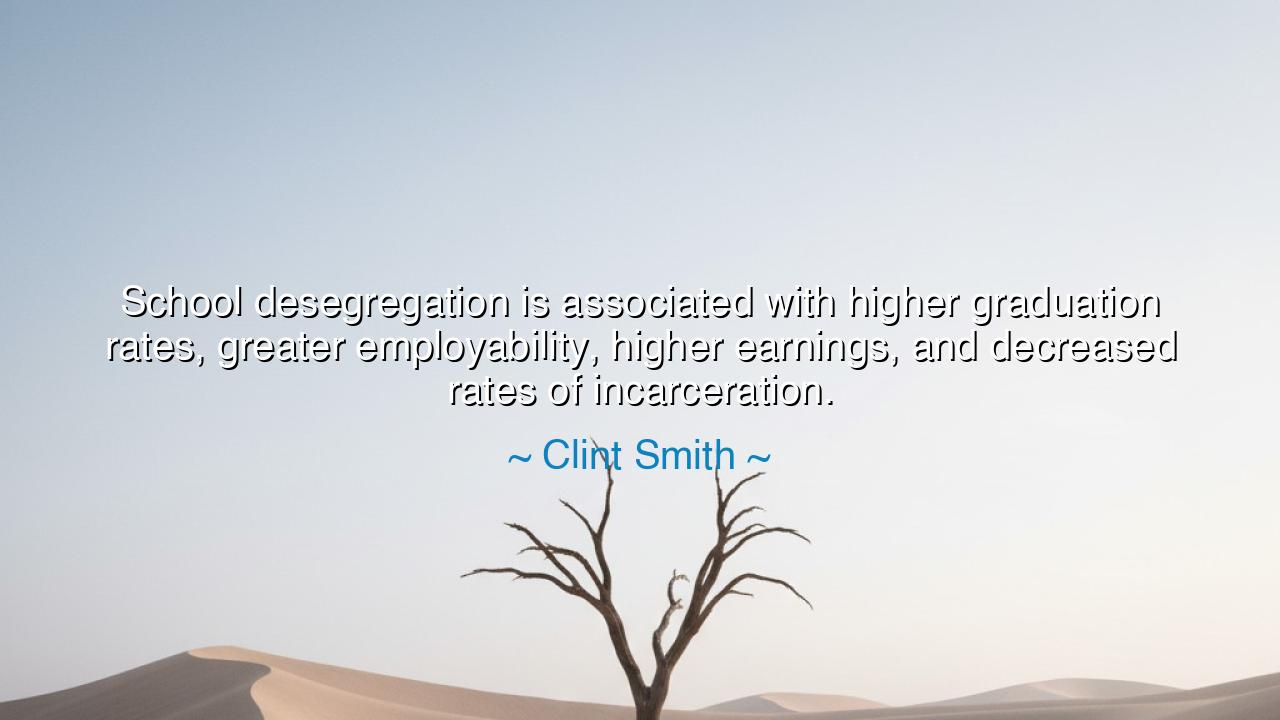
School desegregation is associated with higher graduation rates
School desegregation is associated with higher graduation rates, greater employability, higher earnings, and decreased rates of incarceration.






Hear, O listener, the solemn and noble words of Clint Smith, a poet and scholar whose voice carries the weight of memory and the promise of justice: “School desegregation is associated with higher graduation rates, greater employability, higher earnings, and decreased rates of incarceration.” Though this statement may seem rooted in fact and study, its spirit is far more than statistical — it is a testament to the eternal struggle for equality, to the idea that when the walls between human beings are torn down, all may rise higher together. Beneath these calm words lies a story of suffering and triumph, of a people long denied their rightful place in the sun finally stepping into its light.
The meaning of this quote speaks to more than education; it speaks to liberation. To desegregate schools was to proclaim, at last, that no mind should be limited by the color of its skin, that no child should be barred from knowledge by the accident of birth. For centuries, ignorance was used as a weapon — a means of control, a chain disguised as custom. But education, that sacred fire of the human spirit, cannot be divided without extinguishing the flame of a nation’s soul. When desegregation began, it was not merely a change in policy; it was the beginning of healing, the mending of a moral wound that had bled for generations.
The origin of these words finds its roots in the long and painful history of America’s battle for civil rights. From the hallowed steps of Brown v. Board of Education (1954) came the declaration that “separate but equal” was a lie — a poison that had seeped deep into the fabric of society. It took courage, not from governments alone but from ordinary men and women — from parents who sent their children through angry mobs to attend newly integrated schools, from students who walked hallways lined with hatred and still refused to turn back. It was through their endurance that justice, once abstract, became flesh and blood.
Consider the story of Ruby Bridges, a child of only six years, who in 1960 became one of the first to desegregate an all-white elementary school in New Orleans. Each day, she walked through a sea of hate — grown men and women screaming insults, spitting venom, their faces twisted by fear of equality. Yet Ruby walked on, escorted by federal marshals, her small hands clutching her schoolbooks. Her courage was a sermon without words. Decades later, the very truth that Clint Smith speaks of would be proven: where the walls of segregation fall, the fruit of opportunity grows. Higher graduation rates, greater employability, higher earnings, and decreased incarceration — these are not just outcomes; they are the legacy of courage like hers.
For education is not only the key to knowledge — it is the key to dignity. When a child learns to read, to reason, to question, that child becomes unshackled. And when a nation ensures that every child, regardless of race or wealth, has equal access to that learning, it becomes more than prosperous — it becomes just. Smith’s words remind us that justice is not an abstraction; it can be measured in diplomas earned, in families lifted from poverty, in lives unbroken by despair.
Yet let us not believe that this work is finished. The shadows of segregation still linger — not in law, but in inequality, in schools divided by wealth and opportunity, in the quiet separation of privilege and neglect. The spirit of desegregation must live not only in history books, but in our daily choices — in where we invest, how we teach, and whom we uplift. The true measure of a society’s wisdom is whether it ensures that the child of the poor may learn beside the child of the rich, and both be judged not by heritage, but by heart and effort.
So take this lesson, O reader, into the depth of your soul: Education is the great equalizer, the sacred promise that freedom gives to all. Support it. Protect it. Demand that it be fair. Teach the young that they do not walk alone, but follow the footsteps of heroes who faced hatred and transformed it into hope. For every act that opens the door of learning to another human being is an act of revolution. And as Clint Smith reminds us, when schools are opened to all, so too are the gates of destiny.
Therefore, let us stand as guardians of that truth: that the mind of one child is the treasure of all humanity, and that the strength of a nation is measured not by the wealth of its elite, but by the wisdom it grants to every soul within its care. When education is equal, the chains of the past are broken — and the dawn of justice, long delayed, begins at last to rise.






AAdministratorAdministrator
Welcome, honored guests. Please leave a comment, we will respond soon